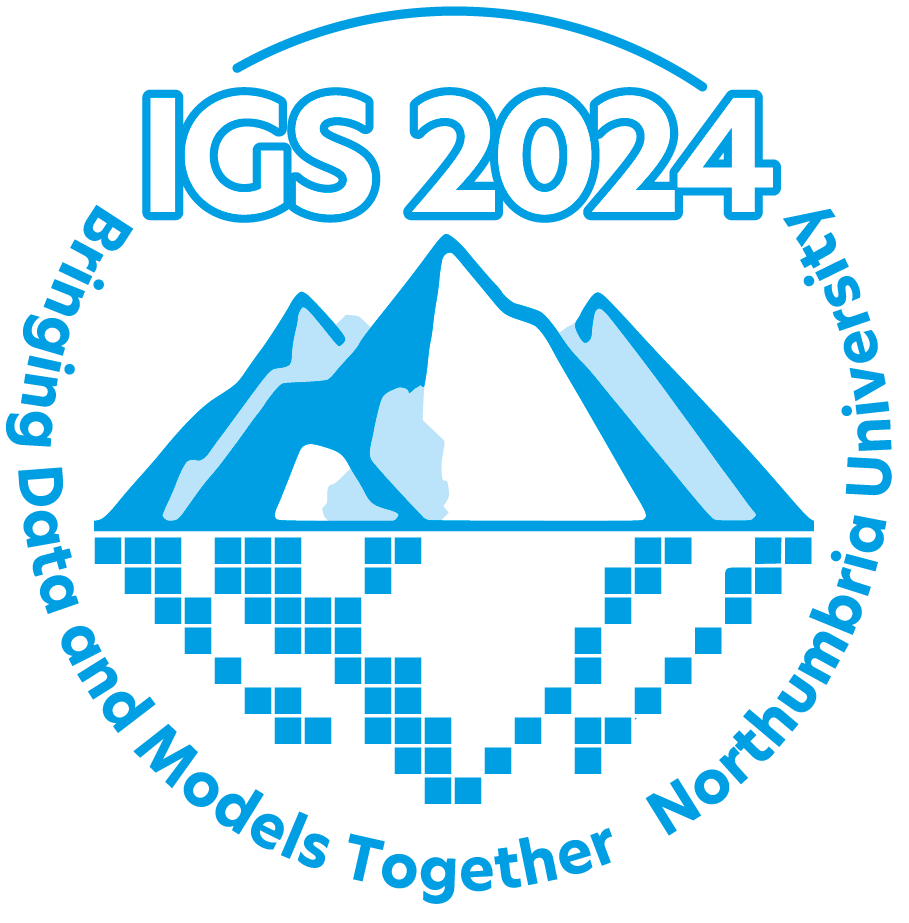The International Glaciological Society (IGS) will prepare a special issue of the Annals of Glaciology with the theme ‘Verification and Validation of Cryospheric Models – Bringing Data and Models Together’ in 2025. The papers will be published continuously online as part of Annals Volume 66 and will simultaneously be brought together in the special issue’s online thematic ‘collection’.
The Associate Chief Editor for this issue is Rachel Carr (Newcastle University). Scientific editors are Hilmar Gudmundsson (Northumbria University), Jan De Rydt (Northumbria University), Adrian Jenkins (Northumbria University), Christine Hvidberg (University of Copenhagen) Ann Rowan (University of Bergen and Bjerknes Centre for Climate Research), Juerg Schweizer (WSL Institute for Snow and Avalanche Research SLF) and Michiel van den Broeke (Utrecht University). More Scientific Editors will be appointed as needed.
Further editors will be appointed as needed.
Schedule for publication:
- 1 May 2024 – paper submissions open
- 31 December 2024 – deadline for submitting a manuscript to this Annals.
- 1 May 2025 – deadline for supplying final accepted paper.
- Accepted papers will be published online as soon as authors have returned their proofs and all corrections have been made.
THEME
Cryospheric models that simulate land and sea ice dynamics, snow physics and permafrost processes have become mainstream tools to assess the past, present and future state of the Earth’s frozen landscapes. In combination with observational data, they provide a powerful, physics-constrained method to address some of Earth Science’s most pressing questions. They form the backbone of sea-level rise projections, they underpin freshwater budget estimates of the world’s glaciated mountain regions and oceans, and they are dynamically integrated with other components of the global climate system. The continued development, calibration and validation of cryospheric models should therefore remain at the forefront of ongoing research. This symposium will invite contributions by the international research community on a wide range of topics in the field of cryospheric model verification and validation, covering a range of different length and timescales. We invite contributions relating to numerical model developments, process-based studies, and/or novel observational products. The focus of the symposium will be on improving numerical models and their interactions with the climate system, although cross-cutting interdisciplinary contributions are invited from a range of topics, as detailed below.
SESSIONS AND TOPICS
We seek papers and presentations on any timely topic related to the verification and validation of numerical models that simulate the cryosphere. All contributions may include and/or combine observational, numerical, theoretical, laboratory or conceptual approaches. Key focus areas include (but are not limited to):
- Ice sheets and ice shelves: observations and modelling of ice dynamics, basal and surface mass balance, with reference to past, present-day and/or future change
- Mountain glaciers and ice caps: advances in numerical simulations of glacier mass balance at local to global scales, new datasets for validation and calibration, and numerical assessments of cryospheric hazards
- Snow and firn processes: advances in numerical simulations and integration with novel observational datasets of firn processes, snow cover, snowpack properties and interactions with the climate system
- Permafrost: initialization and validation of thermal models, advances in the coupling to land surface schemes and GCMs
- Sea ice: advances in sea-ice physics and models, novel datasets and integration with coupled Earth-System models
- Cryosphere–climate interactions: feedback, attribution, tipping points
- Advances in data-driven model initialization and calibration: machine learning, emulators, uncertainty quantification
- Model verification and model intercomparisons: benchmark datasets, including lab measurements, and analytical approaches
- Future perspectives: the impact of model initialization, data gaps, data errors, under-constrained or missing physics
If you have questions about the suitability of your paper for this Annals issue, please contact the Associate Chief Editor for this issue, Rachel Carr
All Annals of Glaciology volumes and papers are Gold Open Access and available on https://www.cambridge.org/core/journals/annals-of-glaciology
The Annals of Glaciology is listed on the ‘Web of Science’. The current journal impact factor is 2.9.
Please note the usual high standards of IGS publications apply, and authors are expected to contribute toward publication of the issue through article processing charges. For further details on article processing charges, as well as on waivers and discounts, please see https://www.cambridge.org/core/journals/annals-of-glaciology/information/open-access-information-for-journal-of-glaciology-and-annals-of-glaciology.
For information on the preparation of manuscripts for submission, please see https://www.cambridge.org/core/journals/annals-of-glaciology/information/instructions-contributors.

